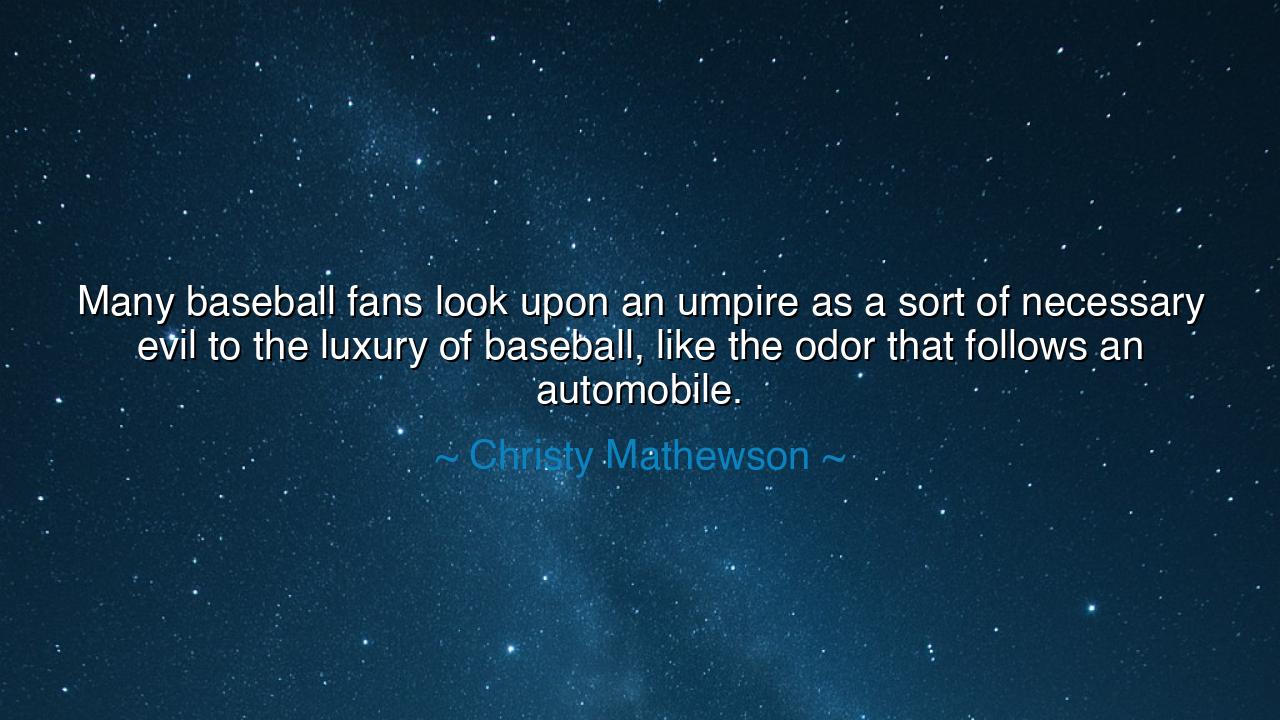
Many baseball fans look upon an umpire as a sort of necessary
Many baseball fans look upon an umpire as a sort of necessary evil to the luxury of baseball, like the odor that follows an automobile.






When Christy Mathewson, the gentleman pitcher of the early twentieth century, declared, “Many baseball fans look upon an umpire as a sort of necessary evil to the luxury of baseball, like the odor that follows an automobile,” he spoke with the wry humor of a man who had long observed the tensions of the diamond. Beneath his jest lies a deep truth: that in every great endeavor, there are figures who, though uncelebrated, sustain the order and integrity of the whole. The umpire, though often scorned, is the guardian of fairness, without whom the contest would dissolve into chaos.
The origin of this insight rests in Mathewson’s own career. Known as one of the greatest pitchers in history, he stood often on the mound, his fate tied to the calls of men in blue. He knew firsthand the wrath of fans when an umpire’s judgment did not please them, and he knew, too, the quiet necessity of their presence. Without the umpire, every strike would be disputed, every out contested, and the game itself would lose the very harmony that gave it life. Thus, he likened the umpire to the odor of an automobile—unwanted, perhaps unpleasant, yet inseparably bound to the power and speed of the machine.
The ancients would have understood this paradox. For in their courts stood judges, whose rulings were often met with groans and curses, yet without whom law could not endure. In their temples stood priests, who demanded sacrifices and rites, without which the gods were not appeased. So too in baseball: the umpire is the unseen pillar, cursed by the crowd but indispensable to the structure. Mathewson’s jest reminds us that what is unpopular may still be essential, and what is scorned may in truth be the very glue that holds order together.
Consider the tale of Armando Galarraga’s imperfect game in 2010. With two outs in the ninth inning, he had pitched flawlessly, every batter retired. Then came the call: an umpire declared a runner safe at first, though replays showed he was clearly out. The perfection was broken. Fans raged, and the umpire, Jim Joyce, was vilified. Yet the next day, Joyce wept openly, admitted his mistake, and Galarraga forgave him with grace. What endured was not the call, but the humanity of the umpire and the dignity of the player. Even in error, the umpire was necessary, for his authority sustained the game’s framework. Without him, there would have been no stage for the drama of forgiveness to unfold.
The lesson is clear: in life, we must learn to respect those roles that may seem thankless or even resented. Leaders, judges, teachers, guardians of rules—often they bear the brunt of complaint, yet without them, society would fall to disorder. Just as the umpire’s strike call keeps the game in motion, so too do the rules and the ones who enforce them keep our lives from drifting into chaos. To despise them is to forget that fairness requires guardians, even imperfect ones.
What then shall we do? First, when faced with authority, let us temper our anger with gratitude, remembering that order is sustained by those who dare to make decisions. Second, let us accept that imperfection is bound to all human judgment, and show grace even when mistakes are made. Third, let us honor the hidden pillars of our communities—the referees, the teachers, the clerks, the workers whose efforts, though uncelebrated, sustain the game of life.
Thus, Christy Mathewson’s playful wisdom rings across the years: “The umpire is a necessary evil, like the odor that follows an automobile.” The game may carry its fragrance of excitement, its roar of engines, its thunder of applause—but along with it comes the odor, the complaints, the unpopular figure who ensures it all runs fairly. Let us learn to see not only the glory of the spectacle, but the necessity of those who keep it upright. In this way, we honor the whole, not just the shining parts, and walk with gratitude for the often unseen keepers of order.






AAdministratorAdministrator
Welcome, honored guests. Please leave a comment, we will respond soon